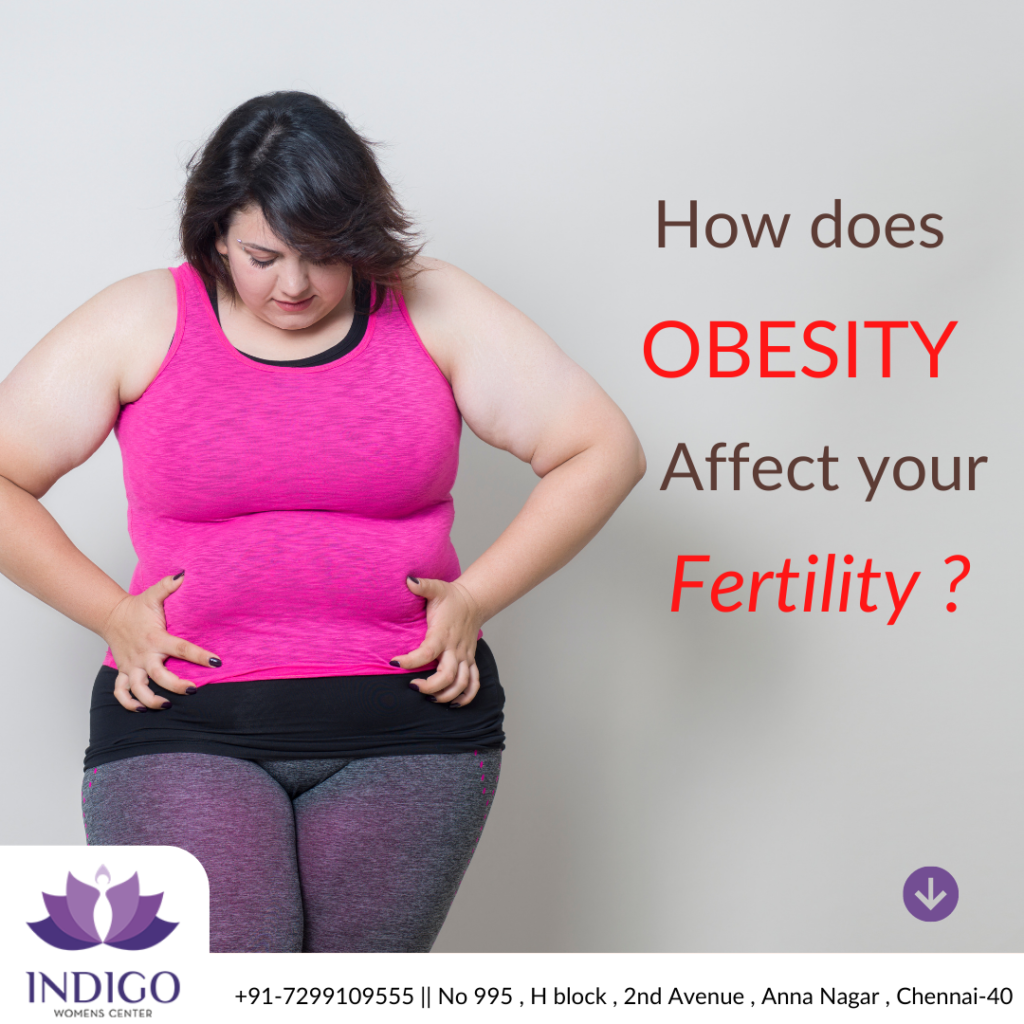• Infertility, explained as a failure to achieve a pregnancy after atleast twelve months of regular and unprotected sexual intercourse.
• Obesity is a known modifiable risk factor for female infertility and can affect maternal health; it also puts the offspring’s health at risk.
• As such, addressing obesity in women , especially if women of reproductive age are Overweight.
• Normal body mass index [BMI] 25–30 and obese is BMI > 30).
Effects of obesity on women’s fertility
The risk of infertility is increased in women of childbearing age with obesity and overweight, respectively, as compared with women of normal weight (BMI 18.5–25).
Obesity
It can negatively affect women’s fertility via menstrual and ovulatory disorders.
• Such disorders include polycystic ovary syndrome(PCOS), the most common cause of female infertility, affecting of women of child-bearing age.
• Insulin resistance is considered to play an important role in the association between PCOS and obesity, because elevated circulating levels of insulin stimulate androgen production by the ovaries.
• Moreover, higher levels of circulating triglycerides and fatty acids, which are associated with obesity and insulin resistance, may directly induce androgen production in predisposed women.
• One of the most common and well documented risk factors for infertility in both men and women is obesity.
Obese Women and Infertility
• women who are overweight or obese tend to have a more difficult time becoming pregnant than normalweight women. Moreover, once pregnancy occurs, obese women have a higher rate of pregnancy loss.Being overweight can also lead to abnormal hormone issues affecting reproductive processes for both women and men. Abnormal hormone signals, as a result of excess weight, negatively impact ovulation and sperm production.
• In women, it can cause the overproduction of insulin, which may cause irregular ovulation. There is also a link between obesity, excess insulin production and the infertility condition known as polycystic ovarian syndrome (PCOS).
• PCOS is a specific medical condition associated with irregular menstrual cycles, anovulation (decreased or stopped ovulation), obesity and elevated levels of male hormones.
Relation between obesity and women’s fertility
Epidemiology of obesity
The prevalence of obesity is increasing significantly worldwide. However, some other factors such as endocrine disorders, hormonal disorders, psychological disorders, and use of some drugs such as steroids and antidepressants may lead to obesity .
Obesity and reproductive functions
The relationship between obesity and reproductive functions has been known for many years and it is still being explored .Several mechanisms are involved in the relationship of fertility and obesity. The insulin resistance and leptin levels are increased and hyperandrogenemia occurs in obese women. Similarly, anovulation, changes in adipokine levels and the HPG axis, and steroidogenesis in obese women affects the reproductive system.
Because of reduced pregnancy rates, increased miscarriage rates, and increased pregnancy complications, live birth rates decrease in obese women in both natural and assisted conceptions. Obesity may impair reproductive functions by affecting both the ovaries and endometrium . The hypothalamic-pituitary-gonadal axis HPG axis deteriorates because of changes in hormonal and some substrate levels. The levels of luteinizing hormone (LH), androstenedi-one, estrone, insulin, triglycerides, and very low density lipo-protein are increased and high density lipoprotein levels are decreased in obese women. Because of these changes, the HPG axis deteriorates and different gynecological effects occur .
Adipose tissue and adipokines
White adipose tissue is a multifunctional organ and it stores energy. It is also an important endocrine organ that regulates energy homeostasis and metabolism by secreting adipokines. These adipokines have important roles in the regulation of a number of physiological processes such as reproduction, immune response, and glucose and lipid metabolism. Excess adipose tissue in women aggravates polycsytic ovarian syndrome (PCOS), and anovulation and may cause hypothalamic hypogonadism .Therefore, almost all of the adipokines seem to have their effects on reproduction by causing insulin resistance.
Obesity, hyperandrogenemia, and PCOS
Obesity may not be the only factor that causes hyperandogenemia and anovulation because some obese women are fertile and do not have hyperandrogenism. Hyperinsulinemia and insulin resistance are the underlying causes that lead to obesity, accompanied by hyperandrogenemia, and alterations in steroidogenesis.
Anovulation and menstrual disturbances
The mechanism of anovulation in obesity remains unclear. Insulin resistance and hyperandrogenemia significantly increased in obese women, particularly who have central obesity. Hyperandrogenemia due to hyperinsulenemia leads to granulosa cell apoptosis, and this may have an effect on ovarian functions. Estrogen production in granulosa cells is stimulated by insulin .Both the excess estrogen and excess androgens play a role in the anovulation .
Obesity and miscarriage
The link between obesity and miscarriage has been noted in both natural and assisted conceptions. A rise in the incidence of spontaneous miscarriage with increasing BMI in patients who had been treated by various ART, including embryo transfer using donor oocytes. One of the proposed mechanisms is the endometrial damage induced by obesity that affects the implantation process more than fertilization and early pregnancy development. In fact, embryo chromosomopathy, the most frequent cause of first trimester miscarriage, does not seem to be increased in women with excess weight . Alterations in endocrine function, embryo quality, or uterine receptivity may contribute to the increased miscarriages .
Obesity and infertility
• The duration required to achieve a spontaneous pregnancy rates are decreased in obese women, including regular ovulatory obese women .
• The probability of pregnancy is reduced .
• obesity in early adulthood alters the reproductive functions.
• The risk of menstrual problems and infertility increased in these women .
• Obesity causes infertility through various pathways, including impaired ovarian follicular development, qualitative and quantitative development of the oocyte, fertilization, embryo development, and implantation .
Obesity and assisted conception
• Women with obesity and infertility are treated using ART.
• Obese infertile women who undergo ART face some difficulties during the treatment.
• Ovarian stimulation in obese women undergoing IVF is low.
• The other adverse outcomes of ovarian stimulation in obese women are reduced oocyte retrieval, poor quality of oocyte and embryo, decreased intrafollicular human chorionic gonadotrophins concentration, decreased peak estradiol levels, decreased number of mature oocytes, decreased incidence of embryo transfer, and decreased number of transferred embryos .
• In Vitro Fertilization when one or both of the partners suffer from infertility related to obesity often they turn to in vitro fertilization (artificially assisted) for help in conceiving.Additionally, obese women were found to have a lower rate of success with embryo implantation. They were also less likely to become pregnant after in vitro fertilization.
The obesity has adverse effects on assisted reproductive technology, including ovulation induction and IVF/ICSI treatments. Obesity reduces the pregnancy rates, live birth rates, and increases the miscarriage rates in treatment cycles.
Obesity and treatment in infertility
• It is difficult to treat anovulatory infertility in obese women because, the obese women have a lower chance of conception following ART as they require a higher dosage of gonadotropin, respond poorly to ovarian stimulation, and have a higher risk of miscarriage.
• Weight loss among overweight and obese women has been shown to improve reproductive outcomes, including fertility.
• Life style modification.
• Even a small weight loss in anovulatory obese infertile women resulted in improvements in ovulation, pregnancy rate, and pregnancy outcome.
• Weight loss should be primarily offered to the anovulatory overweight and obese women.
• Bariatric surgery.
Obese Men and Infertility
• Obesity does not only affect women’s fertility though. Most recently, men with increased body mass indexes (BMI) are significantly more likely to be infertile than normal-weight men.
• Hormone irregularities in men affect stimulation of the testicles that inhibit sperm production.
• Excess fat actually causes the male hormone, testosterone, to be converted into estrogen, and those estrogens decrease testicle stimulation.
• Excess body fat also impacts production of the gonadotropin releasing hormone (GnRH), which is essential to regular ovulation in women, and to the production of sperm in men. Specifically, GnRH triggers release of the luteinizing hormone (LH) and folliclestimulating hormone (FSH), both critical to the development of eggs and sperm.
Conclusion
• Obesity is a major health issue associated with infertility and many other co-morbid conditions.weightloss is extremely valuable in the management of such patients, can enhance fertility,and lead to successful full term pregnancies.
• Overweight and obese patients should be informed about the importance of pre-pregnancy weight reduction and should be encouraged to lose weight before the treatment to reduce the poor obstetrical outcomes due to obesity.
• Although weight loss is the gold standard of treatment in women with a high BMI, ART treatment should not be delayed too much because of increasing age.





